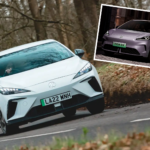Porsche is taking a significant step towards sustainability with the launch of a new EV battery recycling pilot program. The aim of this initiative is to recover valuable raw materials from high-voltage battery packs in electric vehicles once they reach the end of their useful life. The ultimate goal is to establish a “closed-loop” raw material cycle, where new batteries can be produced from old batteries without the need for new, environmentally costly mineral mining.
The German automaker, known for its high-performance sports cars, has been making strides in the electric vehicle market in recent years. With the introduction of all-electric versions of popular models like the Macan and the impressive Porsche Taycan, the company has shown its commitment to sustainable transportation.
The new recycling pilot project is a testament to Porsche’s dedication to innovation and environmental responsibility. By developing innovative recycling processes, the company aims to reduce its dependence on volatile and geopolitically unstable raw material markets. Circular economy principles are a core part of Porsche’s sustainability strategy, and this pilot project underscores the company’s ambitions in this area.
In the long term, Porsche plans to establish a recycling network for EV batteries in collaboration with external partners. This network will help ensure the responsible handling of high-voltage batteries at the end of their life cycle, further reducing the environmental impact of Porsche’s operations.
Porsche’s approach to sustainability involves a three-phase plan for battery recycling. In the first phase, EV batteries are mechanically shredded and processed into a “black mass” containing valuable raw materials like nickel, cobalt, manganese, and lithium. This phase has already produced approximately 65 tons of processed black mass.
In the second phase, the black mass is further separated and refined to meet Porsche’s quality and purity standards for battery materials. Finally, in the third phase, the recovered raw materials are used to manufacture new batteries, demonstrating Porsche’s commitment to a circular economy approach.
By launching this new pilot program, Porsche is not only preparing for upcoming regulatory changes, such as the expected requirements for batteries in the European Union by 2031, but also actively contributing to the advancement of battery recycling technology. By adopting recycled materials early on, the company is reducing its environmental impact while showcasing its commitment to sustainability.
Overall, Porsche’s EV battery recycling pilot program is a significant step towards a more sustainable future for the automotive industry. With its focus on innovation, environmental responsibility, and circular economy principles, Porsche is setting a new standard for sustainable practices in the electric vehicle market.







